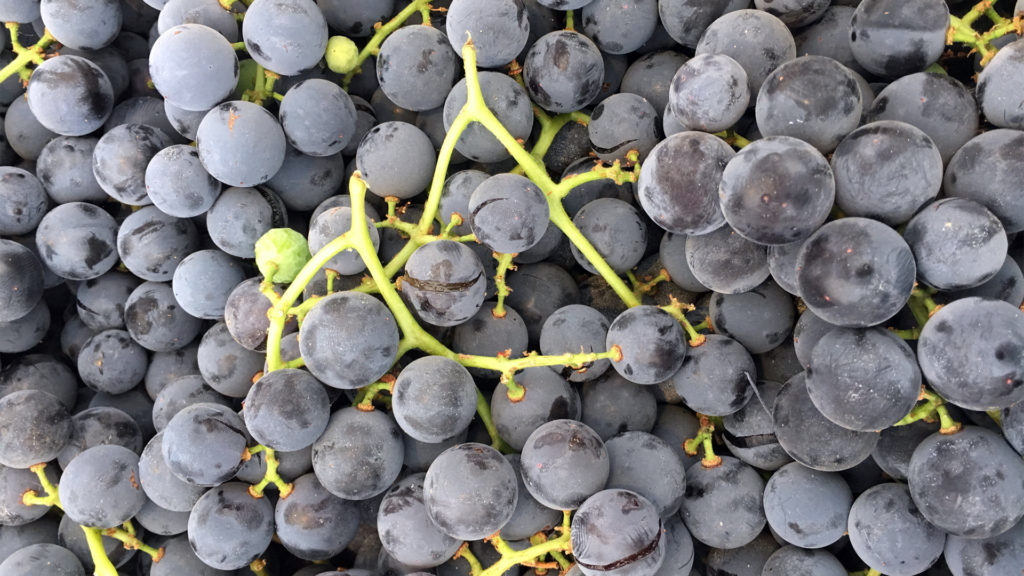Henry David Thoreau, in the years after he wrote On Walden Pond, devoted himself to the study of the native plants in the vicinity of his home town: Concord Massachusetts. One plant he wrote about at some length was the wild grape (Vitis labrusca), which abounded in his neck of the woods. In one passage, he says of grapes: “They are a noble fruit to the eye. I pluck splendid great bunches of the purple ones with a rich bloom on them and the purple glowing through it like fire.”
The wild grapes Thoreau plucked are different than most grapes you get at the supermarket these days. For one thing, they had rather large seeds. For another they had thick skins that easily separate from the fruits. But perhaps the greatest difference was the aroma and flavor, which was much more “grapey” than today’s table grapes.
This flavor is described by grape experts as “foxy,” because Vitus labrusca are commonly known as “fox grapes.” The flavor is one most of us associate with grape-flavored bubble gum and soft drinks more than with the grapes you eat. However, there is a variety of grape available for a short period each year that exhibits this classic grape flavor. It is the Concord grape, which is a cultivar of Vitus labrusca developed in and named after Thoreau’s hometown in 1849, although never mentioned by Thoreau.
Concord grapes are better known as the grapes used to make grape jelly and grape juice than they are as table grapes. This is because they are highly perishable. They have a very short season that extends from early September to the beginning of October. Their absence from stores may also be due to the fact that they have seeds, which most modern consumers shun.
Years ago, you would rarely see Concord grapes west of the Mississippi river. However, they are now being grown in the Pacific Northwest, and Washington has recently surpassed New York as the greatest producer. You can occasionally find them in local stores during their all-too-brief season. If you do, they are well worth trying. Concord grapes are extremely high in anti-oxidants, nearly as high as blueberries.
Concord grape juice is a concentrated source of beneficial anti-oxidants which may have health benefits ranging from reducing hypertension to protecting cells from damage from cigarette smoke and other pollutants.
One thing to be aware of if you buy Concord grape juice is that unless it is made from organic grapes, it may be very high in fluoride. Fluoride is an active ingredient in Cryolite, an insecticide commonly used in commercial vineyards. One common brand of grape juice was found to have 2.6 parts per million of fluoride, more than twice as much as is considered “optimum” in water. If you are drinking Concord grape juice for its health benefits, my advice is to stick to organic.
I think Concord grapes are delicious eaten just as they are. If you have an ice cream maker, you can use them to make a delicious sherbet. The following recipe comes from Chez Panisse Fruit by Alice Waters.
Concord Grape Sherbet
Concord Grapes
1/2 inch water in saucepan
sugar
corn syrupWash and stem the grapes. Put them in the saucepan with the 1/2 inch of water. Cook the grapes over medium-high heat for about 15 minutes, stirring and mashing them to release the juice. Pass the cooked mash first through a food mill and then through a fine-mesh sieve to remove all the seeds and skin. Measure the strained juice. For every cup of juice, stir in a tablespoon of sugar and 2 tablespoons light corn syrup. Heat the mixture gently if necessary, but if the juice is still warm, the sugar should dissolve. Chill the sherbet base and freeze according to the instructions for your ice cream maker.


